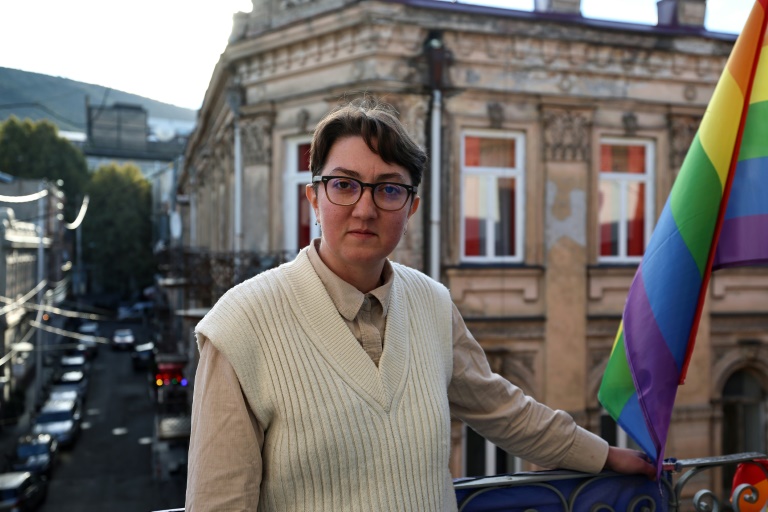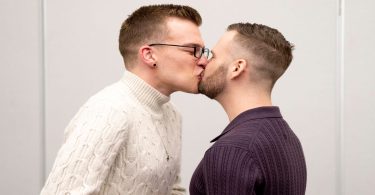Surrounded by rainbow flags and cigarette packets, Georgian LGBTQ activist Tamar Jakeli was smoking anxiously, recounting the “emotional rollercoaster” of the last few days.
Ahead of crucial parliamentary elections this Saturday, the ruling Georgian Dream party is mounting a high-profile campaign against the LGBTQ community — with Jakeli, the head of Tbilisi Pride, singled out.
Jakeli, 28, fears a new wave of persecution should the governing party win the vote.
“They have chosen the LGBT community as one of the main targets,” Jakeli told AFP at an office in the capital Tbilisi.
Georgian Dream has pushed out videos with slogans including “say no to moral degeneracy, yes to family values”.
“And my face is on that,” Jakeli said in a hoarse voice.
The activist has been flipping between hope and despair at the prospect of the vote, one day feeling “really terrible and depressed, and quite desperate… like nothing can change and that this government is way too powerful”.
But most days Jakeli has faith that “despite all these hateful rhetoric, despite all the resources they have, actually the Georgian people are much better than that”.
– Curbing rights –
Saturday’s vote is seen as a crucial test for the democracy of the Black Sea nation of around four million people.
Georgian Dream has been accused of aligning the ex-Soviet republic with Moscow and jeopardising Tbilisi’s long-standing bid for EU membership, including through a campaign against so-called “liberal values”.
Brussels has warned that a swathe of legislation passed this year undermines democracy and that the country is straying from the path towards joining the bloc.
Just three weeks ahead of the vote, the party voted through measures to ban LGBTQ “propaganda”, nullify same-sex marriages conducted abroad and outlaw gender reassignment.
The package drew comparisons with repressive Russian legislation against “gay propaganda” and is seen as widely curbing LGBTQ rights.
Some argue the strategy is a crude election tactic to mobilise votes in a strongly Orthodox Christian society where hostility to the LGBTQ community is prevalent.
Ana Tavadze, another activist with Tbilisi Pride, called the new law a “vaguely worded” tool of repression.
“The narrative that they are trying to push is that the West is imposing these values and its ‘gay propaganda’ on Georgia. And the ruling party is the only one protecting and shielding the Georgian society from it,” Tavadze said.
– Violence –
The anti-LGBTQ law is just the latest piece of legislation targeting Georgian civil society after a controversial “foreign agent” law was pushed through in the face of massive street protests and Western condemnation.
It forces NGOs that receive more than 20 percent of their funding from abroad to register with the authorities or be fined.
Tavadze said the measures deal a double blow to the LGBTQ community, by targeting both their rights and the groups that help fight for and protect them.
Calling the new restrictions “terrifying,” Tavadze said she has already seen “an increasing amount of queer people wanting to leave this country” amid fears of violence.
“The Georgian government for years now has given a green light to violent attackers,” Tavadze said.
“And it has produced politics for years now that has given green light to violence.”
While the bill was working its way through parliament, one of Georgia’s most high-profile transgender activists, Kesaria Abramidze, was stabbed to death in her Tbilisi apartment. Her boyfriend was later arrested as a suspect.
And a week before the vote, another transgender activist, Nata Talikishvili, was attacked with a brick in the street.
Last year, far-right groups violently targeted a march staged by Tbilisi Pride in the city.
– ‘Going underground’ –
Opinion polls in the run-up to the contest show that an anti-Georgian Dream alliance could secure enough votes to oust them from power.
Jakeli hoped Georgians would understand the government is using its vocal anti-LGBTQ campaign “to distract from the real problems”, namely poverty and mass emigration.
But Tavadze still feared what could come after the vote.
“If the government wins the elections, it’s going to be close to impossible for us to continue our organisational operation the way we used to before.”
“We will, of course, have to go more underground,” Tavadze added.
But some said keeping a lower profile might not be a bad thing given the political climate.
One employee of an LGBTQ bar, speaking on condition of anonymity, said they were happy to live a “normal life” among a “good circle of friends”.
The majority of Georgians “don’t want Pride (marches) in the streets,” they said.
“The country won’t change its religion and country quickly,” they added.
“And I don’t think this is the time to oppose it.”
rco/jc/oc/sbk







